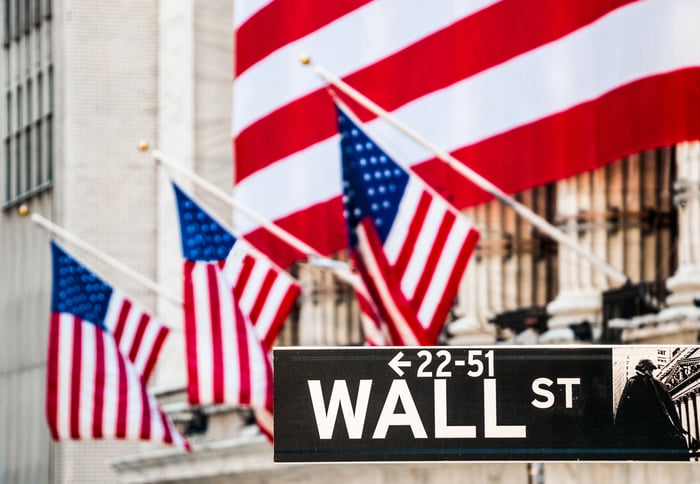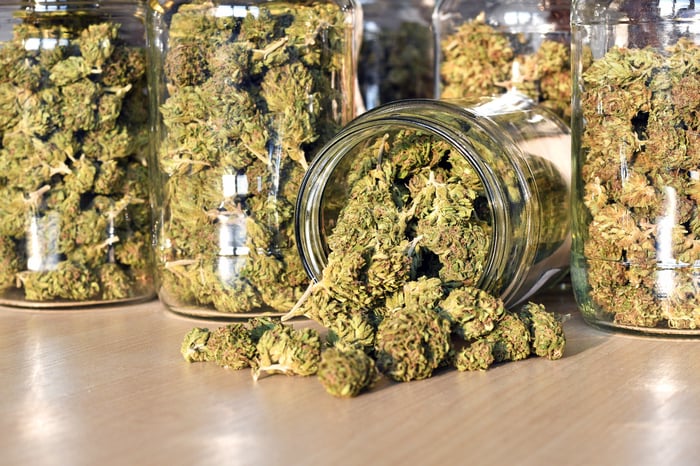At this time last year, marijuana remained one of the hottest industries that investors could buy. Canada had recently legalized recreational pot, and the country was slated to introduce higher-margin derivatives later in the year. The U.S. was also expected to deliver substantive growth with lawmakers in numerous states actively engaged in legalization discussions.
Today, however, the cannabis industry is a veritable disaster. The launch of high-margin derivatives in Canada wound up being delayed, and important provinces like Ontario have struggled to create an adequate retail presence. Meanwhile, high tax rates have made it difficult for U.S. pot stocks to compete with the black market. Very little has gone right, and pot stocks have paid dearly for it, with across the board declines of 50% to 95%.
While these huge drops have some investors searching for bargains, the reality is that a handful of pot stocks listed on the New York Stock Exchange (NYSE) or Nasdaq have fallen so much that they may soon have no choice but to enact a reverse split in order to avoid being booted from these exchanges.

Image source: Getty Images.
Delisting is a real threat
Though this might sound like fearmongering, it's not. Last month, Aurora Cannabis (ACB 18.15%) announced that it would enact a 1-for-12 reverse split on or about May 11, 2020. The NYSE's continued listing rules require a minimum share price of $1, which Aurora Cannabis hasn't been able to maintain for the past two months. It also doesn't help that Aurora Cannabis has been diluting its shareholders into oblivion, thereby weighing down its share price even more. Following the upcoming reverse split, Aurora's stock should be above $8 per share.
Then there's CannTrust, which was given the heave-ho from the NYSE -- albeit an insufficient minimum average share price was far from its only concern. CannTrust wound up illegally growing marijuana in five cultivation rooms for a period of six months, and last year had Health Canada suspend its cultivation and sales licenses. To boot, CannTrust hasn't filed any financial statements in a year, with the exception of providing updates on its cash balance in sporadic news releases.
Equally worrisome, reverse splits are often viewed as a sign of weakness by Wall Street and investors. Although not all reverse splits result in a company's share price sinking even lower, it tends to happen more often than not.
Here are three NYSE-listed pot stocks that may soon need to follow in Aurora's footsteps.

Image source: Getty Images.
HEXO
First up is Quebec-based licensed producer HEXO (HEXO), which has been trading for less than $1 for pretty much the entirety of the past two months. To be honest, I'm sort of shocked that Aurora Cannabis beat HEXO to the punch on the reverse split announcement, especially with HEXO going for a mere $0.50 per share.
Like most Canadian licensed producers, HEXO is in a world of hurt. The company wound up expanding production far more than it needed to, and now it's scrambling to raise capital and paring down its operations to match prevailing market conditions. HEXO wound up shedding 200 jobs last year, and has idled about a third of its peak production capacity. The real killer was the admission that its Newstrike Brands deal was unnecessary. This came in the form of a property, plant, equipment, and intangible assets writedown of $138.3 million Canadian, as well as a CA$111.9 million goodwill writedown in its most recent quarter.
But even with a "leaner' operation, HEXO is far from being out of the woods. Over the past couple of months, HEXO has sold its common stock to raise capital at levels that were well below the prior day's closing price. This isn't a company that's just trying to stay listed on the NYSE – it's trying to do everything it can to simply survive, in my view. That makes HEXO a stock you'll want to avoid like the plague for the foreseeable future.

Image source: Getty Images.
OrganiGram Holdings
Next up is New Brunswick-based OrganiGram Holdings (OGI 2.63%), which ended May 5 at $1.49 per share – mere pennies from its 52-week low. Similar to the NYSE, the Nasdaq requires that listed securities maintain a $1 average share price over a 30-day period or risk being booted from the exchange.
Even though OrganiGram is the only licensed producer in Canada that I believe is worth owning, it's not without its share of problems in the near term. Supply bottlenecks in Ontario and derivative launch delays have not allowed the company to get its cannabis products into nearly enough retail locations.
Furthermore, OrganiGram announced in its fiscal second-quarter press release that it's in violation of one of its financial covenants on a term loan. While hope its high (pardon the pun) that OrganiGram will resolve this issue, the company may need to raise substantive capital in the meantime. Roughly a week after its Q2 2020 report, the company announced a CA$49 million at-the-market equity program that'll allow it to sell common stock to raise capital. In other words, it'll be diluting its shareholders just like its peers.
The one bright spot here is OrganiGram's only production facility, Moncton. The use of a three-tiered growing system should make it one of the most efficient grow sites on the basis of yield per square foot. Additionally, having only one production facility should make it easier for OrganiGram to adjust its expenses to match prevailing market conditions. Nevertheless, this may not prevent the eventual need for a reverse split.

Image source: Getty Images.
Aphria
Finally, there's Canadian licensed producer Aphria (APHA), which was going for $3.60 a share, as of May 5. Though this appears to be a healthy buffer above the $1 minimum listing requirement for the NYSE, Aphria traded below $2 as recently as mid-March. Also, some Wall Street investment banks won't invest in a company with a sub-$5 share price. That gives Aphria a dual motivation to consider a reverse split.
One reason the company may be hesitant to do so is the fact that its operating reports have been coming in better-than-expected. Net cannabis revenue soared 65% on a sequential quarterly basis during the third quarter, with total sales nearly doubling and the company reporting CA$5.7 in net income. Such results would not suggest that Aphria is operating from a position of weakness, as is the case with HEXO and Aurora.
However, the bulk of Aphria's revenue continues to be derived from its pharmaceutical distribution subsidiary CC Pharma. Pharmaceutical distribution revenue can be lumpy at times, and it's relatively low margin. To date, we haven't seen Aphria's cannabis operations consistently deliver an operating profit without the assistance of one-time benefits or fair-value adjustments. Until that happens for this cannabis stock, there exists the real possibility that a reverse split may be needed to keep its stock on the radar of investment banks.





